payroll
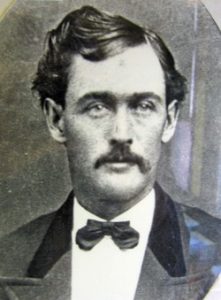 Many men helped to tame the wild west, but unfortunately things didn’t always go exactly as the lawmen planned. Billy Daniels was a pretty typical lawman, but like the thousands of courageous young men and women who helped tame the Wild West, whose names and stories have since been largely forgotten, Billy was not a well remembered lawman. For every Wild Bill Hickok or Wyatt Earp, who have been immortalized by the dramatic exaggerations of dime novelists and journalists, the West had dozens of men like Billy Daniels, who quietly did their duty with little fanfare, celebration, or thanks.
Many men helped to tame the wild west, but unfortunately things didn’t always go exactly as the lawmen planned. Billy Daniels was a pretty typical lawman, but like the thousands of courageous young men and women who helped tame the Wild West, whose names and stories have since been largely forgotten, Billy was not a well remembered lawman. For every Wild Bill Hickok or Wyatt Earp, who have been immortalized by the dramatic exaggerations of dime novelists and journalists, the West had dozens of men like Billy Daniels, who quietly did their duty with little fanfare, celebration, or thanks.
On December 8, 1883, five desperadoes led by Daniel “Big Dan” Dowd, rode into the booming mining town of Bisbee, Arizona. Dowd had heard that the $7,000 payroll of the Copper Queen Mine would be in the vault at the Bisbee General Store. He had planned to surprise the store owners, and make off with the payroll, but things didn’t go exactly as planned. When the outlaws barged into the store with their guns drawn, demanding the payroll, they discovered, to Dowd’s disappointment, that they were too early. The payroll hadn’t arrived yet. The outlaws quickly gathered up what money there was, somewhere between $900 to $3,000, and took valuable rings and watches from the customers who just happened to be in the store. After the robbery, for reasons that are unclear…but possibly, anger…the robbery turned into a slaughter. When the five desperadoes rode away, they left behind four dead or dying people, including Deputy Sheriff Tom Smith and a Bisbee woman named Anna Roberts.
The people of Arizona were stunned. The people had cooperated with the outlaws. There was no reason to kill 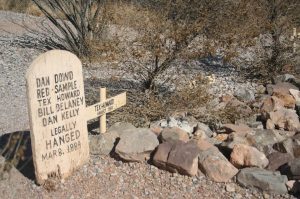 those people. The killings were a completely senseless show of brutality. The newspapers called it the “Bisbee Massacre.” The sheriff quickly organized citizen posses to track down the killers, placing Deputy Sheriff Billy Daniels at the head of one. Unfortunately, the posses soon ran out of clues and the trail grew cold. Most of the citizen members gave up, but not Daniels. He stubbornly continued the pursuit alone. Daniels eventually learned the identities of the five men from area ranchers and began to track them down one by one.
those people. The killings were a completely senseless show of brutality. The newspapers called it the “Bisbee Massacre.” The sheriff quickly organized citizen posses to track down the killers, placing Deputy Sheriff Billy Daniels at the head of one. Unfortunately, the posses soon ran out of clues and the trail grew cold. Most of the citizen members gave up, but not Daniels. He stubbornly continued the pursuit alone. Daniels eventually learned the identities of the five men from area ranchers and began to track them down one by one.
Daniels found one of the killers in Deming, New Mexico, and arrested him. He then learned from a Mexican informant that the gang leader, Big Dan Dowd, had fled south of the border to a hideout at Sabinal, Chihuahua. Daniels went under cover, disguising himself as an ore buyer. He tricked Dowd into a meeting and took him prisoner. A few weeks later, Daniels returned to Mexico and arrested another of the outlaws. Other law officers apprehended the remaining two members of the gang. A jury in Tombstone, Arizona, quickly convicted all five men. They were sentenced to be hanged simultaneously. As the noose was fitted around his neck on the five-man gallows, Big Dan reportedly muttered, “This is a regular killing machine.”
Daniels ran for sheriff the net year, but oddly lost. I would think that a hometown hero would be a shoo-in. After all he had done for the town, it would seem that being the sheriff was a thankless job. He found a new 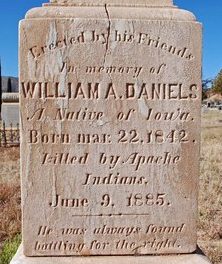 position as an inspector of customs. The job required him to travel all around the vast and often isolated Arizona countryside, where various bands of hostile Apache Indians were a serious danger. Early on the morning of June 10, 1885, Daniels and two companions were riding up a narrow canyon trail in the Mule Mountains east of Bisbee. Daniels, who was in the lead, rode into an Apache ambush. The first bullets killed his horse, and the animal collapsed, pinning Daniels to the ground. Trapped, Daniels used his rifle to defend himself as best he could, but the Apache quickly overwhelmed him and cut his throat. A mere two years after Arizona Deputy Sheriff William Daniels apprehended three of the five outlaws responsible for the Bisbee Massacre, it was an Apache Indians ambush that would end his life. His two companions escaped with their lives and returned the next day with a posse. They found Daniels’ badly mutilated corpse but were unable to track the Apache Indians who murdered him. I guess they lacked Daniels’ under cover or investigative skills.
position as an inspector of customs. The job required him to travel all around the vast and often isolated Arizona countryside, where various bands of hostile Apache Indians were a serious danger. Early on the morning of June 10, 1885, Daniels and two companions were riding up a narrow canyon trail in the Mule Mountains east of Bisbee. Daniels, who was in the lead, rode into an Apache ambush. The first bullets killed his horse, and the animal collapsed, pinning Daniels to the ground. Trapped, Daniels used his rifle to defend himself as best he could, but the Apache quickly overwhelmed him and cut his throat. A mere two years after Arizona Deputy Sheriff William Daniels apprehended three of the five outlaws responsible for the Bisbee Massacre, it was an Apache Indians ambush that would end his life. His two companions escaped with their lives and returned the next day with a posse. They found Daniels’ badly mutilated corpse but were unable to track the Apache Indians who murdered him. I guess they lacked Daniels’ under cover or investigative skills.
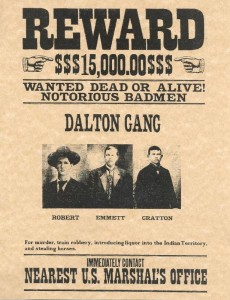
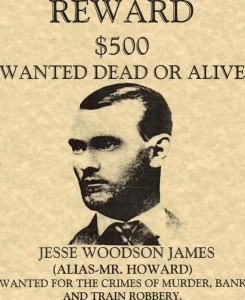 As the railroad spread across this land, and payrolls began coming in by way of the railroad, a new breed of criminal showed up on the scene…the train robbers. At first, the train robbers got away with it, because no one had really given much thought to the possibility of such a thing happening. Gangs like Jesse James…who was best known as a bank robber, but was also one of the early train robbers, Butch Cassidy and the Wild Bunch, the Dalton Gang, and the Reno Gang terrorized the railways, stealing the payrolls of crews working on building the railroads and towns in the west.
As the railroad spread across this land, and payrolls began coming in by way of the railroad, a new breed of criminal showed up on the scene…the train robbers. At first, the train robbers got away with it, because no one had really given much thought to the possibility of such a thing happening. Gangs like Jesse James…who was best known as a bank robber, but was also one of the early train robbers, Butch Cassidy and the Wild Bunch, the Dalton Gang, and the Reno Gang terrorized the railways, stealing the payrolls of crews working on building the railroads and towns in the west.
With the advent of train robberies came a need for a solution. Enter the train police. At first the railroads would arrange for a posse to go after the robbers, but eventually they realized that the posse was too little too late. They had to take affirmative action. So they put the police on the train with the money. I’m sure that more violence came from that action, but the robbers probably didn’t get away with it as often as they had been.
I think that in many ways, we have almost romanticized the train robbers, but in reality, they were like any other criminal. They would kill for the money they were after. The police were under as much pressure as the police these days. You can’t face a gun as a regular part of your job and not have some degree of fear for your life. These men were the law, and they were pretty much on their own. They couldn’t call in the state police, or the police from the next town over. Those were too far away…especially with the distances the trains traveled. The railroad police were the only thing standing between the robbers and the money.
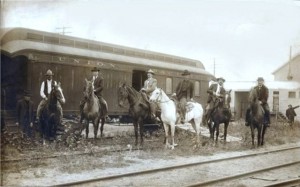
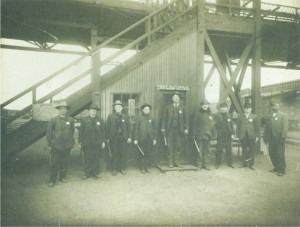 Theirs was an important job too. Every time the train was robbed, peoples lives were affected. Without the payroll money, the workers couldn’t support their families, and that caused more problems. The workers were angry and then desperate. I don’t think police work would be for me, but I have to wonder if police work was harder back in the old west, or now, with the terrorism and gang issues…or if police work is police work, no matter what era it is.
Theirs was an important job too. Every time the train was robbed, peoples lives were affected. Without the payroll money, the workers couldn’t support their families, and that caused more problems. The workers were angry and then desperate. I don’t think police work would be for me, but I have to wonder if police work was harder back in the old west, or now, with the terrorism and gang issues…or if police work is police work, no matter what era it is.
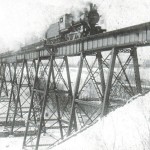 In their early years, the railroads were quite powerful companies, and with good reason. The railroad reduced travel time across the United States from days or months, to hours, in many cases. They brought supplies, payroll, and people from back east to the west quickly. The railroad did not come without some confusion, however. Even as late as the 1880s, most United States towns had their own system for keeping track of time, based on where the sun was at high noon. I had never given much thought to this, but I suppose it could have been a big mess, since the train’s arrival would be very mixed up, and the end result would be that the train might be scheduled to arrive in several places at once.
In their early years, the railroads were quite powerful companies, and with good reason. The railroad reduced travel time across the United States from days or months, to hours, in many cases. They brought supplies, payroll, and people from back east to the west quickly. The railroad did not come without some confusion, however. Even as late as the 1880s, most United States towns had their own system for keeping track of time, based on where the sun was at high noon. I had never given much thought to this, but I suppose it could have been a big mess, since the train’s arrival would be very mixed up, and the end result would be that the train might be scheduled to arrive in several places at once.
Because the railroads were quite powerful, they took it upon themselves to make a monumental change that would affect the entire nation, and Canada too. At exactly noon on this day in 1883, American and Canadian railroads broke the continent into four sections, and began using a system of time zones that we still use to this day, with very few changes made to it over the years. I’m sure there were people who did not like the new system much, but most people quickly embraced it, because their lives depended on the railroad in one way or another. The root of the problem they had was that they moved passengers and freight over the thousands of miles the line covered. With the varying times in towns along the route, the train 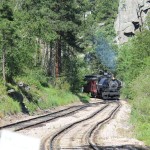 ended up with dozens of different departure and arrival times. No one really knew when the train would arrive…except possibly the engineer. I’m sure that caused chaos in the train stations…especially in the bigger cities. These days, we have to be at the airport two hours early for flights, because of screening, so imagine that kind of a scenario in the small train stations of the old west. This scheduling nightmare had to be stopped, and time zones were the only logical way to do it.
ended up with dozens of different departure and arrival times. No one really knew when the train would arrive…except possibly the engineer. I’m sure that caused chaos in the train stations…especially in the bigger cities. These days, we have to be at the airport two hours early for flights, because of screening, so imagine that kind of a scenario in the small train stations of the old west. This scheduling nightmare had to be stopped, and time zones were the only logical way to do it.
With the use of time zones, rail transportation became far more efficient. The thing that seems rather odd, is that they didn’t go to the United States or Canadian governments to resolve the problem, and if the government at that time was as inefficient as our congress is right now, I can fully understand why they didn’t. Imaging waiting six years to make a decision concerning time and its vital role in rail travel. Something had to be done right away, and the railroad was just bold enough to do it. As it turned out, no one tried to stop them either. I suppose everyone could see just how logical their plan was, and no one complained. So, the railroad companies agreed to create four continental time zones, and that decision has changed the way we live to this day.
The lines they adopted to make those time zones were very close to the ones we have today. I’m sure that any changes are based on where towns began to fall along the zone lines. It wasn’t until as late as 1918 that Congress officially adopted the railroad time zones and put them under the Interstate Commerce Commission. 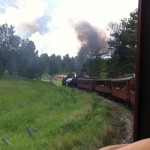 Just imagine, if you will, if the people and the railroad had waited for Congress to act on this matter. There would have been 35 more years of unorganized and frustrating railroad travel. Something that should have revolutionized travel, would have been relegated to the stone age again, because of Congress’ lack of action. Even after the system was implemented and people finally had an organized schedule, that was relatively accurate…because you can’t predict accidents or weather related delays very well, Congress sat on their hands, and I suppose they operated the government on government time instead. In this writer’s opinion, the time zones were a wonderful idea, and have benefitted this nation very well since 1883. My family has a long history of working on the railroad, and that is a fact that I am very proud of.
Just imagine, if you will, if the people and the railroad had waited for Congress to act on this matter. There would have been 35 more years of unorganized and frustrating railroad travel. Something that should have revolutionized travel, would have been relegated to the stone age again, because of Congress’ lack of action. Even after the system was implemented and people finally had an organized schedule, that was relatively accurate…because you can’t predict accidents or weather related delays very well, Congress sat on their hands, and I suppose they operated the government on government time instead. In this writer’s opinion, the time zones were a wonderful idea, and have benefitted this nation very well since 1883. My family has a long history of working on the railroad, and that is a fact that I am very proud of.

